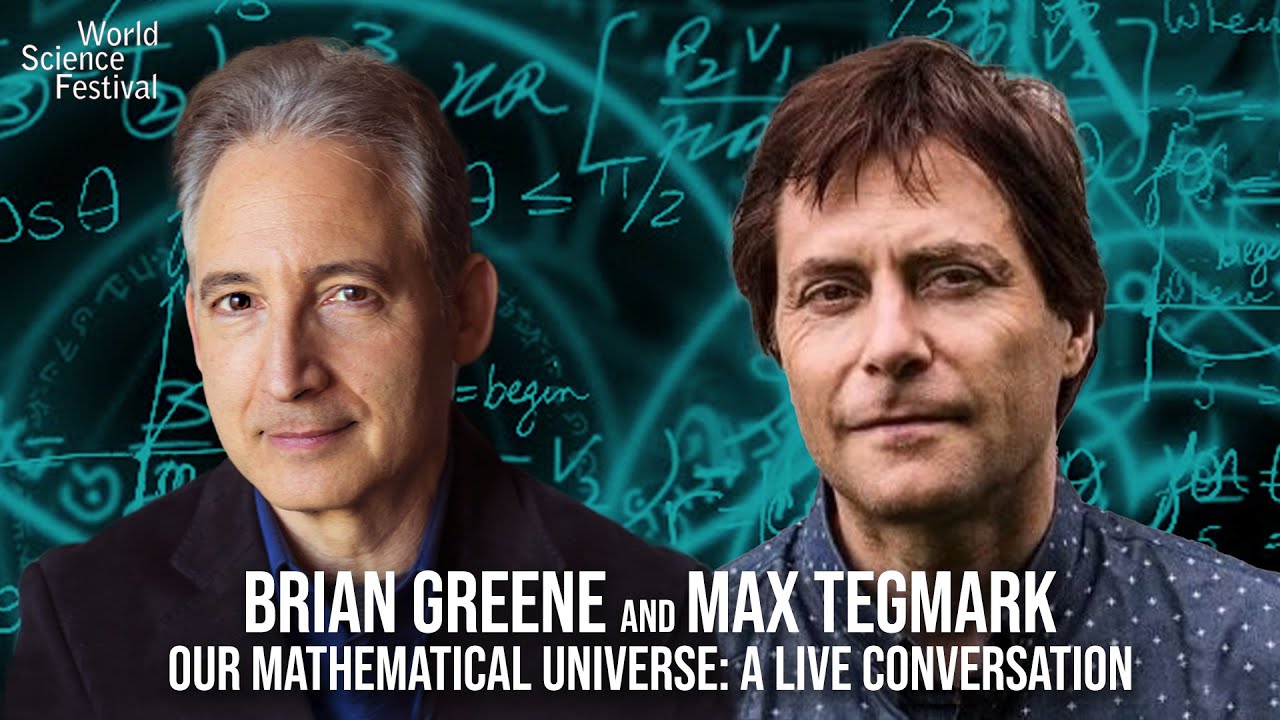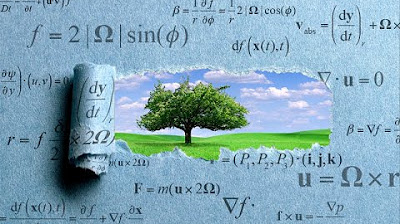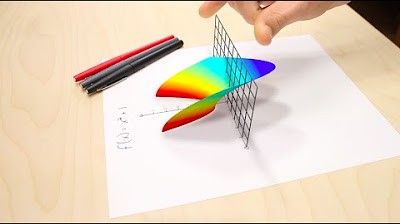Is math discovered or invented? - Jeff Dekofsky
TLDRThe video script explores the age-old debate on whether mathematics is a human invention or a discovery, a concept created to understand the universe or the universe's native language. It discusses the perspectives of ancient philosophers like the Pythagoreans, Plato, and Euclid, who believed in the independent reality of mathematics. In contrast, others like Kronecker and Hilbert viewed it as a human construct, a logical exercise with no existence outside human thought. The video also highlights the 'unreasonable effectiveness of mathematics' as coined by Wigner, showcasing how theories developed in isolation later became essential frameworks for explaining the universe. Examples include Hardy's number theory in cryptography, Fibonacci's sequence in nature, and Riemann's work in general relativity. The summary concludes by reflecting on the profound nature of the debate, which often takes on a spiritual dimension, and poses a thought-provoking question about the existence of numbers when no one is there to count them.
Takeaways
- 🤔 The debate on whether mathematics is discovered or invented has persisted since ancient times.
- 📚 Ancient Greek philosophers like the Pythagoreans and Plato believed in the independent reality of numbers and mathematical concepts.
- 📏 Euclid, known as the father of geometry, viewed nature as a physical manifestation of mathematical laws.
- 💡 Some argue that mathematical statements are human constructs with no existence outside of our consciousness.
- 👨🏫 Leopold Kronecker believed that only natural numbers were divine creations, with all other mathematical concepts being human-made.
- 📘 David Hilbert aimed to axiomatize all of mathematics, treating it as a logical construct or a philosophical game.
- 🌐 Henri Poincaré's work on non-Euclidean geometry challenged the universality of Euclidean geometry, suggesting it was one outcome of a set of rules.
- 🏆 Eugene Wigner highlighted the 'unreasonable effectiveness of mathematics', arguing for its reality and discovery by humans.
- 🔍 Purely theoretical mathematical work often finds practical applications in understanding the universe, as seen with Hardy's number theory in cryptography and genetics.
- 🐰 Fibonacci's sequence, initially a theoretical construct, is found in various natural phenomena, from sunflower seeds to the structure of pineapples.
- 🧬 Mathematical knot theory, initially developed to describe geometric positions, was later used to explain DNA replication and may contribute to string theory.
- 🧐 The debate on the nature of mathematics can become deeply philosophical and spiritual, questioning the existence of mathematical truths independent of human observation.
Q & A
What is the debate about whether mathematics was discovered or invented?
-The debate revolves around whether mathematical concepts are inherent to the universe and exist regardless of human understanding (discovery), or if they are constructs created by humans to help understand the universe (invention).
What did the Pythagoreans of 5th Century Greece believe about numbers?
-The Pythagoreans believed that numbers were living entities and universal principles, with the number one being the 'monad,' the generator of all other numbers and the source of all creation.
What was Plato's view on the reality of mathematical concepts?
-Plato argued that mathematical concepts were concrete and as real as the universe itself, existing independently of our knowledge of them.
What was Euclid's perspective on the relationship between nature and mathematical laws?
-Euclid, the father of geometry, believed that nature was the physical manifestation of mathematical laws.
How does the view that mathematics is an invented logic exercise differ from the view that it is a discovery?
-The view that mathematics is an invented logic exercise posits that mathematical truths are based on rules created by humans and have no existence outside of human thought. In contrast, the view that it is a discovery suggests that mathematical truths exist independently of human understanding.
What was Leopold Kronecker's famous statement about the creation of mathematical concepts?
-Leopold Kronecker famously stated: 'God created the natural numbers, all else is the work of man.' This reflects his belief that only the most basic mathematical concepts are inherent, while more complex ones are human inventions.
What was David Hilbert's approach to establishing mathematics as a logical construct?
-David Hilbert attempted to axiomatize all of mathematics, similar to what Euclid had done with geometry, viewing mathematics as a deeply philosophical game with a logical structure.
What did Henri Poincaré believe about the nature of Euclidean geometry?
-Henri Poincaré believed that the existence of non-Euclidean geometry, which deals with non-flat surfaces, proved that Euclidean geometry was not a universal truth but one outcome of using a particular set of rules.
What is the significance of Eugene Wigner's phrase 'the unreasonable effectiveness of mathematics'?
-Eugene Wigner's phrase suggests that mathematics is real and discovered by people. He pointed out that many purely mathematical theories, developed without any intention of describing physical phenomena, later turned out to be essential frameworks for explaining how the universe works.
Can you provide an example of how a purely mathematical theory was later found to have practical applications?
-Gottfried Hardy's number theory, which he believed would never be useful, later helped establish cryptography. Another example is the Hardy-Weinberg law in genetics, which won a Nobel prize and was derived from his theoretical work.
How did Fibonacci's sequence relate to the natural world?
-Fibonacci discovered his famous sequence while studying the growth of an idealized rabbit population. Later, the sequence was found in various natural phenomena, such as the arrangement of sunflower seeds, flower petals, the structure of a pineapple, and the branching of bronchi in the lungs.
What is the connection between Bernhard Riemann's non-Euclidean work and Einstein's general relativity?
-Bernhard Riemann's work on non-Euclidean geometry, which was developed in the 1850s, was used by Einstein a century later as a fundamental component in the model for general relativity.
How has mathematical knot theory been applied in modern science?
-Mathematical knot theory, initially developed to describe the geometry of position, was later used in the late 20th century to explain how DNA unravels itself during replication. It may also provide key insights for string theory.
What is the philosophical question posed at the end of the script?
-The philosophical question posed is whether mathematics is an invention, a universal truth, a human product, or a natural or divine creation, and it suggests that the answer might depend on the specific concept being considered.
Outlines
🔢 The Existence and Nature of Mathematics
This paragraph explores the age-old debate on whether mathematics is a human invention or an inherent aspect of the universe. It discusses the perspectives of ancient Greek philosophers like the Pythagoreans and Plato, who believed in the concrete reality of numbers and mathematical laws. It also contrasts these views with those of modern mathematicians like Leopold Kronecker and David Hilbert, who saw mathematics as a human construct based on logical rules. The paragraph further delves into the 'unreasonable effectiveness of mathematics' as highlighted by Eugene Wigner, illustrating how abstract mathematical theories often find practical applications in understanding the universe. It concludes by posing philosophical questions about the existence of mathematical truths independent of human cognition.
Mindmap
Keywords
💡Mathematics
💡Discovery vs. Invention
💡Pythagoreans
💡Plato
💡Euclid
💡Leopold Kronecker
💡David Hilbert
💡Henri Poincaré
💡Eugene Wigner
💡Gottfried Hardy
💡Fibonacci Sequence
💡Bernhard Riemann
💡Mathematical Knot Theory
Highlights
The debate on whether mathematics was discovered or invented has been ongoing since ancient times.
The Pythagoreans believed numbers were living entities and universal principles.
Plato argued that mathematical concepts are as real as the universe, independent of human knowledge.
Euclid viewed nature as a physical manifestation of mathematical laws.
Some argue that mathematical statements are human-invented logic exercises without physical existence.
Leopold Kronecker's famous statement emphasizes that only natural numbers were created by God, with all else being human work.
David Hilbert aimed to axiomatize all of mathematics, viewing it as a philosophical game.
Henri Poincaré's work on non-Euclidean geometry challenged the universality of Euclidean geometry.
Eugene Wigner's 'unreasonable effectiveness of mathematics' supports the idea that math is real and discovered by people.
Wigner highlighted how purely mathematical theories later became essential frameworks for understanding the universe.
Gottfried Hardy's number theory, initially seen as impractical, later became fundamental to cryptography and genetics.
The Fibonacci sequence, discovered through an idealized rabbit population model, is found in various natural phenomena.
Bernhard Riemann's non-Euclidean work laid the foundation for Einstein's general theory of relativity a century later.
Mathematical knot theory, initially developed in the 18th century, was later used to explain DNA replication.
The debate on the nature of mathematics often becomes spiritual, with varying opinions from influential mathematicians and scientists.
The question of whether mathematics is an invention or a discovery remains a profound philosophical and potentially spiritual inquiry.
The concept of whether a number exists if it is not observed, as illustrated by the 'number of trees in a forest' analogy.
Transcripts
Browse More Related Video

Decoding the Secret Patterns of Nature - Fibonacci Ratio & Pi - Full Documentary

Roger Penrose - Is Mathematics Invented or Discovered?

Our Mathematical Universe: Brian Greene & Max Tegmark

Does Math Reveal Reality?

Imaginary Numbers Are Real [Part 1: Introduction]

The HISTORY of MATHEMATICS. Documentary
5.0 / 5 (0 votes)
Thanks for rating: